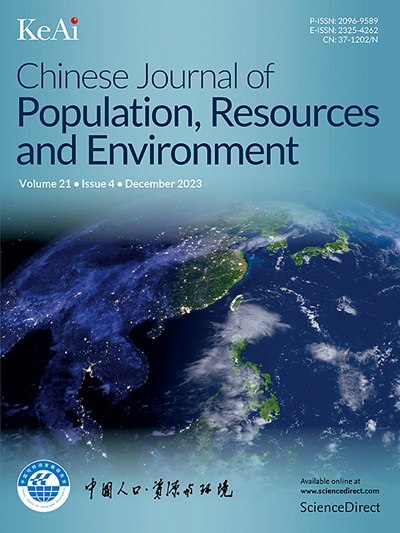宏观经济变量对环境的影响:以伊朗和部分欧佩克成员国为例
IF 4.8
4区 环境科学与生态学
Q2 ENVIRONMENTAL STUDIES
Chinese Journal of Population Resources and Environment
Pub Date : 2025-06-01
DOI:10.1016/j.cjpre.2025.05.008
引用次数: 0
摘要
考虑到环境在人们生活中不可否认的重要性,本研究探讨了信息通信技术(ICT)和外国直接投资(FDI)对实现环境可持续性的综合影响。随着碳排放的增加及其对环境、社会经济和政治的破坏性影响,主要的研究问题是:政府,特别是石油出口国,以前采用了什么策略来减少污染,他们计划在未来实施什么政策?在石油输出国组织成员国采取的政策中,外国直接投资和信息通信技术的发展是否有效地防止了环境破坏?为了解决这一问题,本研究使用可再生能源消耗、ICT强度、FDI和城市化作为解释变量,二氧化碳(CO2)排放作为因变量。使用面板向量自回归(PVAR)方法对2000年至2020年的欧佩克成员国进行了分析。结果表明,对FDI、劳动力、城市人口和可再生能源消费的冲击减少了二氧化碳排放,而对总资本形成的冲击增加了它们。ICT冲击对二氧化碳排放的影响可以忽略不计。方差分析进一步表明,城市人口、劳动力和FDI对CO2行为的影响最大,因此,有必要吸引更多的FDI来帮助欧佩克成员国减少CO2。本文章由计算机程序翻译,如有差异,请以英文原文为准。
Environmental impacts of macroeconomic variables: A case study of Iran and selected OPEC members
Considering the undeniable importance of the environment in people’s lives, this study investigates the combined effects of information and communication technology (ICT) and foreign direct investment (FDI) on achieving environmental sustainability. With increasing carbon emissions and their destructive environmental, socioeconomic, and political consequences, the main research question is: what strategies have governments, especially oil-exporting countries, previously used to reduce pollution, and what policies do they plan to implement in the future? Among the policies undertaken by OPEC member countries, has FDI and the development of ICT been effective in preventing environmental damage? To address this, this study uses renewable energy consumption, ICT intensity, FDI, and urbanization as explanatory variables, with carbon dioxide (CO2) emissions as the dependent variable. The analysis focuses on OPEC members from 2000 to 2020 using a panel vector autoregression (PVAR) method. The results indicate that a shock to FDI, labor force, urban population, and renewable energy consumption reduces CO2 emissions while a shock to gross capital formation increases them. The impact of an ICT shock on CO2 emissions is negligible. Variance analysis further shows that urban population, labor force, and FDI have the greatest influence on CO2 behavior, therefore, it is necessary to attract more FDI to help reduce CO2 in OPEC members.
求助全文
通过发布文献求助,成功后即可免费获取论文全文。
去求助
来源期刊

Chinese Journal of Population Resources and Environment
ENVIRONMENTAL STUDIES-
CiteScore
4.30
自引率
1.10%
发文量
791
审稿时长
79 days
期刊介绍:
The Chinese Journal of Population, Resources and Environment (CJPRE) is a peer-reviewed international academic journal that publishes original research in the fields of economic, population, resource, and environment studies as they relate to sustainable development. The journal aims to address and evaluate theoretical frameworks, capability building initiatives, strategic goals, ethical values, empirical research, methodologies, and techniques in the field. CJPRE began publication in 1992 and is sponsored by the Chinese Society for Sustainable Development (CSSD), the Research Center for Sustainable Development of Shandong Province, the Administrative Center for China's Agenda 21 (ACCA21), and Shandong Normal University. The Chinese title of the journal was inscribed by the former Chinese leader, Mr. Deng Xiaoping. Initially focused on China's advances in sustainable development, CJPRE now also highlights global developments from both developed and developing countries.
 求助内容:
求助内容: 应助结果提醒方式:
应助结果提醒方式:


